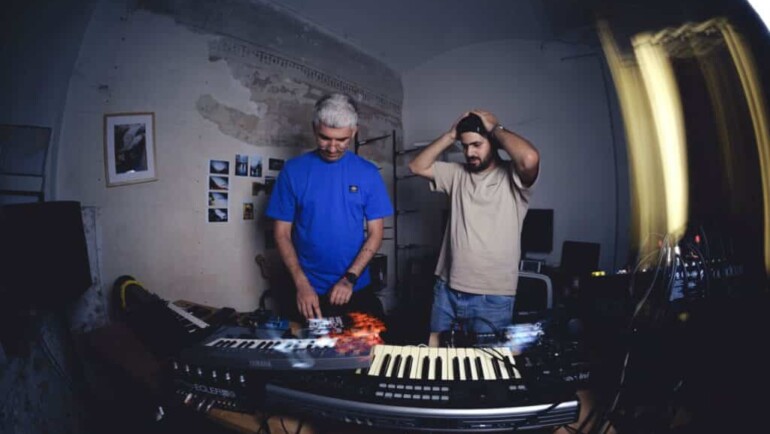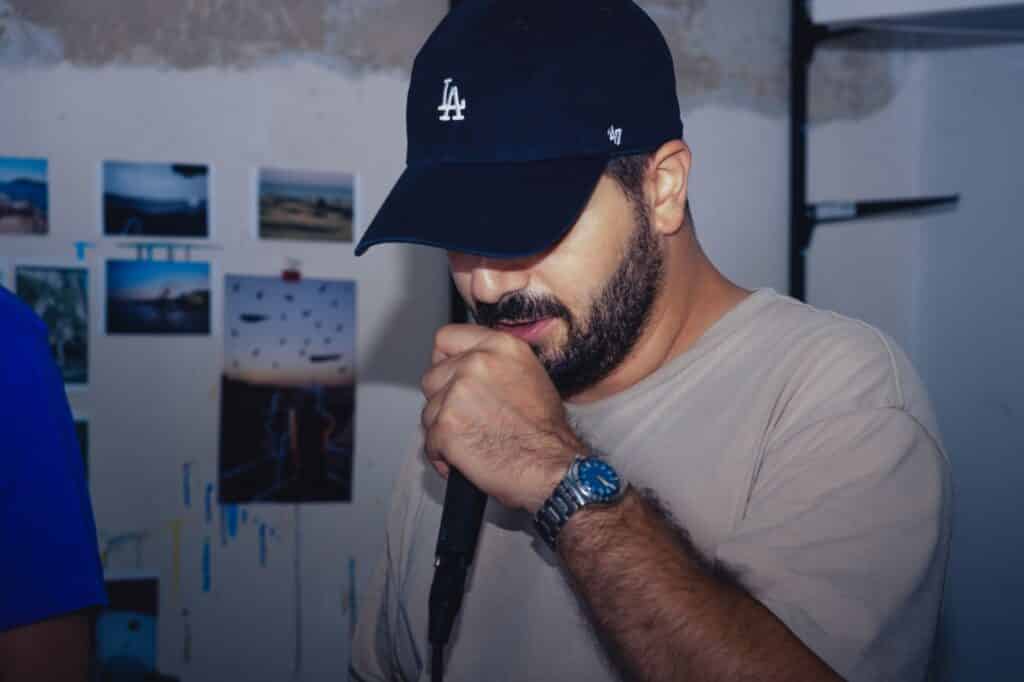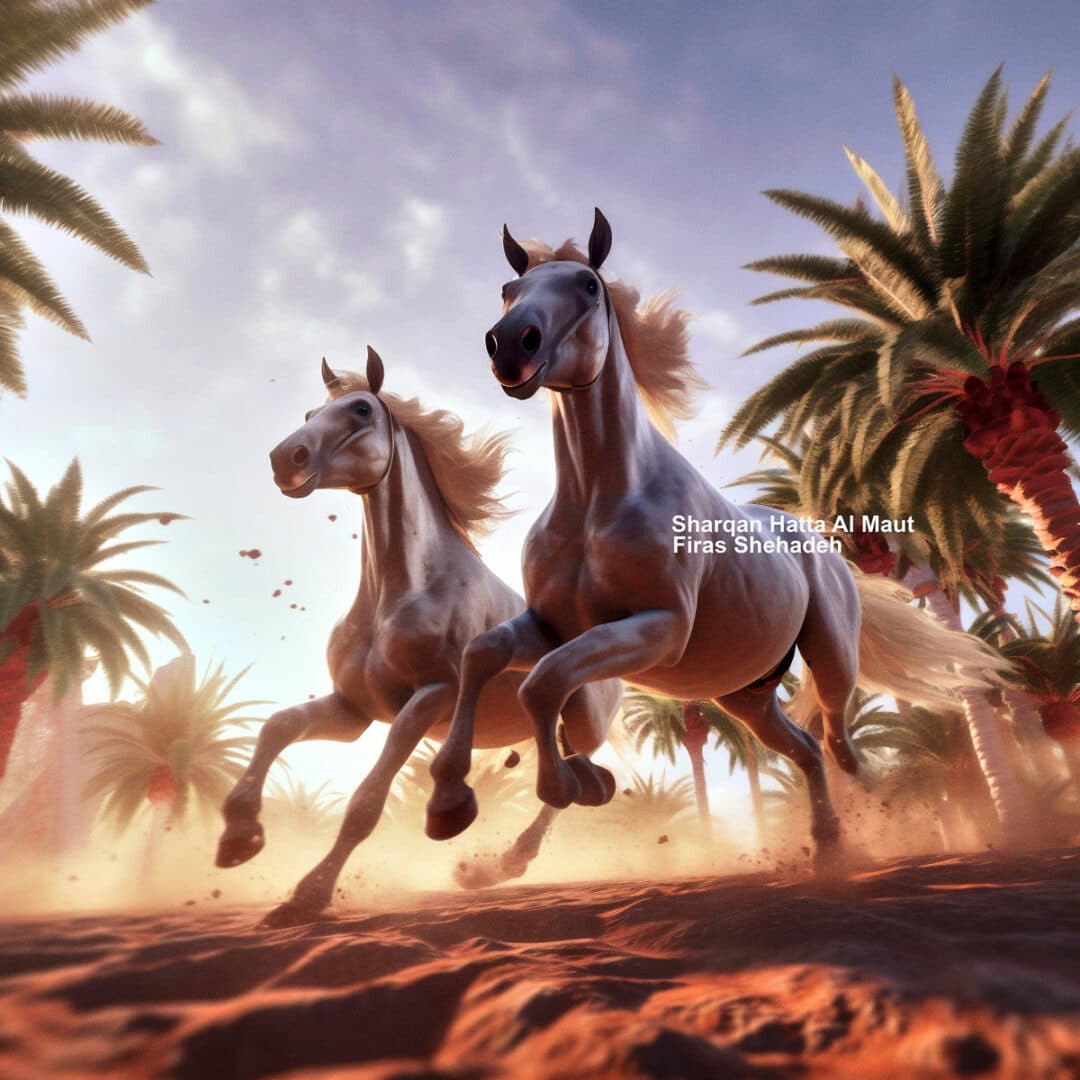
In the 2000s, Abboud Hashem (a.k.a. Asifeh / Stormtrap) was a major figure in the first generation of Palestinian hip-hop; Firas Shehadeh, a native of Jordan, became part of the second. Hashem’s most recent release is a 2020 album of beats on the Vienna label Well Gedacht; Shehadeh released his latest album, Sharqan Hatta Al Maut, on Bandcamp in June. The longtime collaborators performed together for the first time at the Unsafe+Sounds festival on the weekend; Christoph Benkeser recently met with them to talk about concepts, colonialism, and Willhaben.
Your both have roots in Palestine. How did the two of you meet?
Abboud Hashem: Firas and his brother Ahmad had a rap project called Torabyeh, that I was into around 2010. I got in contact with Ahmad and we met later on in Jordan. He brought me along to the Darat al Funun arts institute in Amman, where Firas was working – but we only met briefly, and then we didn’t see each other for a long time.
Firas Shehadeh: I come from Ramallah, in Palestine, but I was born in Amman and grew up in Jordan and Saudi Arabia. In 2015 I moved to Vienna to study at the Akademie der bildenden Künste. By that time I was already familiar with Abboud’s work, particularly Ramallah Underground.
Abboud Hashem: I was born in Vienna and lived here for the first nine years of my life, then my family moved to Ramallah. After finishing school, I moved back to Vienna in 2004 and stayed until 2011, when I moved back to Ramallah. In 2015 I came back to Vienna.
“The means to say so many things in a single song”
You originally started with hip-hop, right?
Abboud Hashem: Yes, but it wasn’t just about the music for me – it was about a community and a chance for creative heads to get together and jam. I listened to other genres too, like punk and metal, but hip-hop was the music that matched my thoughts and words at the time – it gave me the means to say so many things in a single song, and the beats communicated a message and feelings.
Firas Shehadeh: My older cousins and their friends played me the Wu-Tang Clan, Mobb Deep, and Nas; it was a formative experience. I understood quickly that these musicians lived in a reality similar to ours, that they were retaking power and influence with their music. Hip-hop is their way of expressing themselves artistically, politically, and societally. This revelation opened my eyes to the power of hip-hop.
You both emphasize the attitude of hip-hop.
Firas Shehadeh: Definitely; it feels immediately familiar. I got into other music later, like traditional Palestinian music and punk, but hip-hop was always a culture that somehow encompassed all these expressions, these energies.

“There were tanks in the streets and snipers on the Rooftops”
Abboud, you founded Ramallah Underground in the 2000s. Why was the microphone so important to you?
Abboud Hashem: Originally, I wasn’t seriously planning to make music; I was just trying things out on Fruity Loops with an electric guitar I had gotten. I got to know Muqata’a, with whom I started Ramallah Underground, in high school; he was making trip-hop at the time. We were hanging out together and came up with the idea of releasing something meaningful. That was during the Second Intifada; everywhere there were Israeli tanks in the streets and Israeli snipers on the rooftops. F-16s and Apache helicopters were dropping bombs. There were checkpoints between every neighborhood and long, strict curfews. Most of the time, we sat at home and weren’t allowed to go anywhere – not even to school, because of the danger of getting arrested, or harassed, or even shot by the Israeli occupational troops. We used the time and the experience to express our anger and frustration about the reality we were living – we were reporting on reality, in our own way.
Firas Shehadeh: The internet played a big role in the Arabic hip-hop movement at the time. Between the First and Second Intifadas, computers became more and more accessible, and we had the internet. That was where we traded our music with one another, where we could meet and spread our music – especially between Palestinians in Palestine and in the diaspora.
Abboud Hashem: Yes, after we released our work in the internet, people from all over the world – but particularly in Arabic-speaking countries – started noticing it.
“I wanted to be uncompromising”
More recently, you have both been using less words, making more abstract, experimental music. What’s the reason for the change?
Abboud Hashem: My “traditional” hip-hop phase ended around 2010, not long after Ramallah Underground broke up. Some members of the community were starting to make weirder, more experimental music than before. A friend of mine even started calling it post-hip-hop, because we were moving away from traditional forms, using distorted beats and glitchy vocals. I was embedded in that scene, so it inspired me to experiment more myself. I wanted to be uncompromising, to shift the border between what’s accepted as music and what isn’t.
Can you be more specific?
Abboud Hashem: A lot of my newer work is more open to interpretation. There’s usually a theme, but not always an explicit message. This shift toward more instrumental production happened at the same time that I moved back to Vienna, in 2015: I discovered that I could buy vintage music equipment on [the Austrian classified ads portal] Willhaben – everything from synthesizers to sequencers and samplers, things that had come out around the time I was born. Experimenting with this equipment influenced the way I work. I wanted to try to get them to speak; it’s about accepting them and their sounds the way they are, with all their imperfections.
It’s interesting that you talk about analog equipment, though your sound is more a product of the digital age.
Abboud Hashem: For me, it was always a combination of analog and digital sources. I was never really dogmatic about what I used and didn’t use. The equipment is just the means to an end; what really counts is the concept and the result. Firas and I produce music on our iPad now, too.
Firas Shehadeh: It’s perfect – I can watch my child while I brainstorm ideas and work on new sounds on the couch. Like Abboud said: it’s about the result, not the equipment. I draw inspiration from internet culture; I sample sounds from places like YouTube and TikTok. I don’t even make field recordings anymore; I feel like there’s nothing new left to record in the real world. Most of the time, I work with existing material, regardless of where it comes from.

“A journey that transcends time and Space”
I mean more the feeling you get when you listen to it and watch it – it has a digital quality to it.
Firas Shehadeh: Our work is influenced strongly by the effects of technology, politics, and the digital aesthetic – but it’s not tied down by nostalgia; it’s more a vision arising out of our own personal experiences. A perfect example is my last album, Sharqan Hatta Al Maut, where I combined simple sampling techniques with AI prompts. With the combination of titles, sounds, and visuals, I take the listener on a journey that transcends time and space, through a landscape of sound.
On the cover, we see two white horses galloping through an animated oasis.
Firas Shehadeh: Yes, the idea behind the album was rolling back European colonialism in Palestine. We took inspiration from various sources – from personal stories passed down for generations, from the Palestinian captives’ movement, from Palestinian literary works, and from science fiction. It’s a little like Akira, but told from my perspective as a Palestinian. And horses, of course, are powerful symbols in Arab culture generally and particularly in Palestine: they stand for resistance, power, honor, and swiftness.
Please continue.
Firas Shehadeh: The Israeli colonial power has one of the most modern military arsenals in the world, but 75 years into the nakba [the permanent displacement of the majority of Palestinians in the late 1940s] they still can’t decode the people and the land that they occupied. Their most advanced killing technology hasn’t managed to break the Palestinian identity, or its connection to its homeland. My strategy is to question the colonial algorithms by regarding life as an unpredictable subject.
“Yo, that’s good – you should put it out!”
This isn’t the first time you’ve worked together – what common vision do the two of you pursue?
Firas Shehadeh: In our solo projects, we each follow an approach that goes beyond music. For instance, when I work on a new film or video, I share the script with Abboud so I can get his feedback on it. Similarly, Abboud brings me into his creative process by playing me his new albums or tracks. We’ve also worked on projects where I made videos for his music, or he helped me with sounds for my videos. This mutual exchange of feedback and support makes for an effective artistic result.
You didn’t start producing music for a long time. Why?
Firas Shehadeh: I started getting into music production before my solo project, but usually in the background, or with very small DIY improvisations. I was interested in sound design and editing – the “unmusical”. Abboud was the reason I started releasing music at all. I played him my beats, and one day he said: “Yo, that’s good; you should put it out!” I was skeptical whether anyone would listen at first, but then I didn’t care – I just put things out that I liked. We finally started making music together in 2017. The first song was finished in about half an hour.
Abboud Hashem: That’s why I always like working with Firas: we talk about it; we record; we make the video. That’s it. I’ve never worked with anyone who was able to make decisions as spontaneously as Firas. It reminds me of the creative atmosphere we had in Palestine – we had a space there where we were constantly giving one another feedback and motivating each other. Firas makes that possible for me in Vienna.
Firas Shehadeh: I was lucky to find Abboud in Vienna. Our backgrounds are different, but there are certain experiences that we share. When we meet, we spend most of the time doing other things besides making music. We just talk – about an upcoming exhibition, or a new book, or the falafel we had yesterday. But as soon as we feel the urge to produce something, it goes quickly – we’ve been preparing ourselves for that moment the entire time.
Abboud Hashem: Sometimes it almost feels too easy, because of that. But [our work] together has multiple levels – the music, but the titles and the aesthetics as well.
Is there a single thing that you like about one another?
Abboud Hashem: Our friendship comes before the music. We understand each other. Besides that, I really value how Firas is able to put things into words. I don’t normally talk as much, unless I’m writing texts of my own.
Firas Shehadeh: It’s more than a friendship; it’s like family. Abboud may not talk as much as I do, but when he does say something, it has weight. Not because of big, impressive words, but because of his life experience.
Christoph Benkeser, translated from the German original by Philip Yaeger
